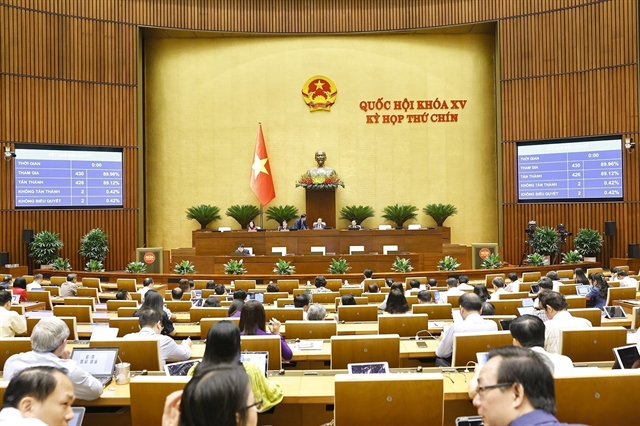 Politics & Law
Politics & Law

 |
| National Assembly deputies cast their votes on the amended law on Wednesday. — VNA/VNS Photo |
HÀ NỘI — The National Assembly on Wednesday passed a law abolishing the death penalty for eight criminal offences, including embezzlement and taking bribes, in a move reflecting changes in domestic policy and international integration efforts.
With 429 out of 439 lawmakers voting in favour, accounting for 89.75 per cent of the total lawmakers, the legislative body approved amendments to the Penal Code during its morning session.
The amended law will take effect on July 1 and is part of a roader reform effort to update Việt Nam’s criminal legal framework after more than eight years.
Crimes that are no longer eligible for the death penalty include activities aimed at overthrowing the people’s administration, sabotaging the State’s material and technical infrastructure, producing or trading counterfeit medicines for treatment or prevention, undermining peace and provoking war of aggression, espionage, illegal transportation of narcotics, embezzlement, and taking bribes.
The law includes a transitional clause specifying that those who received death sentences for these eight offences before July 1 will not be executed. The Chief Justice of the Supreme People’s Court will instead commute those sentences to life imprisonment.
According to the Government’s report to the National Assembly, the move aligns with Việt Nam’s current conditions. It maintains the necessary deterrent effect while supporting the gradual reduction of capital punishment and meeting the requirements for international cooperation and development.
In the case of embezzlement and bribery, the amended law sets stricter conditions for sentence reduction. Individuals sentenced to life imprisonment for these crimes will only be eligible for reduced sentences if they voluntarily return at least three-quarters of the assets involved and actively cooperate with authorities or make significant contributions to the investigation.
The amendment also introduces new penalties for the illegal use of narcotics. Under Article 256a, individuals undergoing or recently discharged from rehabilitation who continue using drugs will be subject to criminal charges.
In addition, the law raises the minimum prison terms for crimes related to environmental pollution, hazardous waste management, drug production and trafficking, and food safety violations. These include Articles 235, 236, 248, 249, 251 and 317 of the Penal Code.
Fines for environmental crimes and offences involving counterfeit food, medicine, agricultural products or corruption have also been doubled. The Government cited changes in economic and social conditions, including a two-fold increase in base salary and a two-fold rise in per capita income since 2015, to justify the adjustment. — VNS